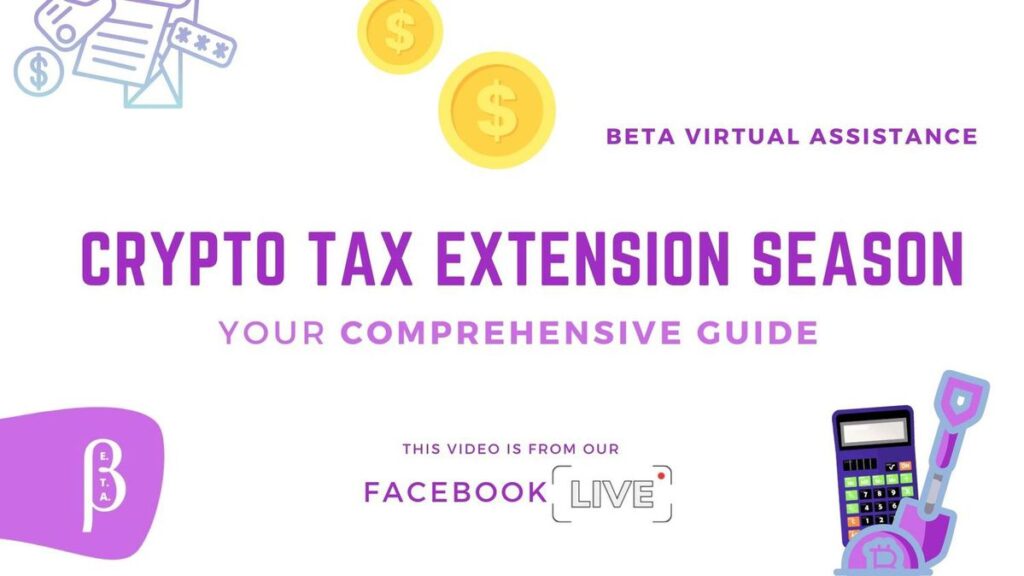
In this blog post, we’ll cover everything you need to know about the tax consequences of your crypto investments, from reporting to penalties and more. Let’s get started!
Introduction:
Hey there, crypto enthusiasts! It’s tax season for USA investors, and that means it’s time to dive into the world of cryptocurrency taxes. I’m Jessica from Beta Virtual Assistance, and I’m here to help you navigate the complex landscape of crypto taxation.
(This post is from our series of Facebook Lives. Catch the next one on our Facebook channel.)
First, before we get too far, this blog post may contain links to products that we have tried and liked. If you click on the link and make a purchase, we may earn a small commission, which does not increase the price for you nor directly affect whether or not we recommend the product. (We’ll even tell you which products we DIDn’t like and let you make your own evaluations!)
Filing Deadline and Extensions:
First things first, if you filed for a tax extension in April and pushed the deadline to October 15th, that time has arrived. It’s crucial not to procrastinate any further. Take this opportunity to ensure you’re on the right track with your crypto taxes.

Reporting Crypto Transactions:
If you’ve engaged in any crypto transactions, whether buying, selling, or trading, you must report them. The very first question on the USA tax form asks if you’ve received or disposed of any crypto or digital currency. It’s imperative to answer truthfully, as failing to do so can lead to fines and penalties.
Penalties for Late Filing and Payment:
Now, let’s talk about penalties. There are three significant penalties you should be aware of:
- Failure to File Penalty: This penalty amounts to 5% of the unpaid tax liability for each month your tax return is late, up to a maximum of 25% of the balance due. The maximum penalty is reached quickly (in 5 months), so try to avoid this one if you can by filing SOMETHING, even if you have to amend it later.
- Failure to Pay Penalty: If you owe taxes and don’t pay them on time, you’ll incur a penalty of 0.5% of the unpaid tax liability each month, up to 25% of the total. This penalty will add up more slowly than the Failure to File Penalty and perhaps buy you some time to scrounge up the money for a payment.
- Interest Penalty: Interest charges begin accruing on the original due date for your taxes (usually April 15th). To avoid or minimize this penalty, do your best to estimate your income and deductions and then make sure you’ve paid enough into the tax system through wage withholding, estimated taxes, credits, etc so that you exceed the eventual tax bill due. (Better to have a refund when all is said and done then to owe more money in interest and penalties because you underpaid!)
Keep in mind that these penalties are often piled up on top of each other. In fact, if you Fail to File AND you Fail to Pay, you may owe 47% combined for not filing or paying plus any interest on the amount due.

Importance of Reporting Losses:
Some crypto investors wonder if they should bother reporting their losses. The answer is a resounding yes! Reporting your losses is not just about complying with the government; it’s also about using those losses to offset your gains, ultimately reducing your tax liability. So, take advantage of any losses in your crypto portfolio and make sure you get full credit for reporting them.
Estimated Taxes and Avoiding Interest:
To minimize the risk of underpayment penalties and interest charges, estimate your taxes as accurately as possible when filing in April or with an application for an extension. Paying more than you think you owe is far better than facing penalties later on.
Also keep in mind that if your current tax year’s payments are within a certain percentage of the previous year’s payments and income, you may avoid certain penalties for underpayment of tax. Consult an accountant or tax preparer to determine the specific threshold for your situation.
Seeking Help and Negotiating:
If you find yourself facing a substantial tax bill that you can’t immediately cover, don’t panic. The IRS is open to negotiation and offers payment plans to help you settle your debt gradually. Reach out to a tax advocate or the IRS itself to explore your options and prevent further penalties.

Important Deadlines:
Remember, the tax deadline this year is October 16th due to scheduling quirks. It’s essential to submit your tax forms on time to avoid the Failure-to-File penalty. Additionally, be aware that state taxes typically follow the federal deadline, but it’s always wise to double-check your specific state’s requirements.
Required Forms:
When filing your crypto taxes, you’ll primarily need the following forms:
Form 1040: The standard income tax return form.
Form 8949: Use this form for reporting your crypto capital gains, trades, and related transactions.
Other Schedules: Depending on your crypto activities (e.g., interest, mining, or self-employment income), you may need additional schedules like Schedule One, B, or C. Consult a tax expert for guidance.
Conclusion:
In the world of crypto investing, staying compliant with tax regulations is crucial. Failing to report your crypto activities can lead to significant financial consequences. So, as a responsible investor, make sure to report all your transactions accurately, even if you’ve experienced losses. Seek professional advice if needed, and remember that being proactive with your taxes is the best way to avoid headaches and penalties down the road.
Thank you for joining us today, and if you have any questions or need assistance with your crypto taxes, feel free to reach out to us at Beta Virtual Assistance: https://betava.link/fb.
Interested in finding out more about us or how we can help you with your crypto taxes? Book a call here: https://betava.link/call
Stay compliant and make the most of your crypto investments!
Wondering if you need help with your crypto taxes?
Take our short mini-course to find out! (Free to you if you USE it….)
Did you read our previous post about crypto taxes titled: Crypto Tax Adventures: Real-Life Stories of Managing Cryptocurrency Taxes
Find out more about this topic by listening to our Audio podcast or watching our YouTube video below.





Leave a Reply